Shadows Come, and Darkness Falls, but There is Always Light: Guest Meditation Patrick Hayes9/25/2014 I live in the American South, am originally from the Midwest, and am almost-but-not-quite-yet a lawyer. My passions in life, apart from spending time with my wonderful fiancée, are reading, writing, and research; my academic background is in history, politics, and the law. Really, I’m pretty much a quiet, boring nerd. I was born and raised Catholic, and came back to the Catholic Church after a long, unchurched hiatus during my adolescence. Please feel free to contact me at [email protected]. Lately in my life, the days have seemingly revolved completely around illness and stress from work. The past three weeks or so have consisted of long, hard days, nights with little sleep, and attempting (vainly, as it turned out) to stave off another round of acute sickness. This past Friday, I was beginning to get ill. I went to a walk-in clinic that afternoon, was given some medications, and went home to start preparing for the long and stressful week to come. I work in the legal field, and we had a hearing coming up. I had been tasked with a long, tedious, but ultimately rewarding task to assist in preparation for the hearing, which I had finished on Thursday. Friday, I began to prepare to assist at the hearing itself, and Monday was supposed to be completely taken up with these preparations. Tuesday, the hearing was scheduled to last all day. By Saturday night, however, it was obvious that I was not getting any better, and indeed, my acute illness was continuing to worsen. By Sunday, I was in terrible shape. I should have gone to an urgent care clinic then, but there are none here that are open on Sundays. At the moment, I can’t afford a visit to the emergency room. So, I waited, and continued to fade. On Monday I staggered into work exhausted, my lungs in rebellion, knowing that if I didn’t go back to see a doctor I would potentially end up in the hospital soon (I know the processes of my conditions, and I know that sign quite well). But, I had no choice. Preparations had to be made. The hearing had to go on. There was no one who could do my job for me. I was not a happy camper, but camp I would. And then, one of my coworkers came up to me and said “did you hear? The hearing’s been cancelled, with no reschedule.” Immediately I felt a wave of relief wash over me. That meant no preparations today, no hearing all day tomorrow. That meant I could go home, and go to the doctor. And I did just that, before things got too bad to handle outside a hospital. It is now Tuesday as I write this, and I’m not sitting in a courtroom coughing, wheezing, barely able to breathe; I’m at my desk, quietly resting, recovering. Darkness cleared, and there was light. 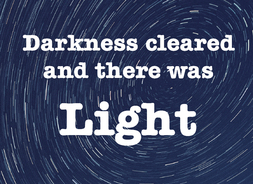 This is merely the latest in a pattern that’s been going on throughout my adult life. Shadows fall, and darkness comes. Sometimes, that darkness is merely an annoyance, a shadow seen in peripheral vision that distracts from the goodness in life, whispers that remind me of the fear and grief of my worst years, but little more. At other times, the darkness is overwhelming, all-consuming, taking over my life almost completely, to the point where I can barely, if at all, see that there is any light remaining, let alone feel its warmth upon me. But always, always, at the end, in the depths of the abyss, when life seems the darkest and all lights have seemingly gone out, something breaks through, something brings me back from the edge. Last year, after being laid off and on unemployment for several months, I was on the verge of bankruptcy and homelessness. Then, I got this job, after what seemed like an endless year of fruitless interviews and hundreds of applications. So, I keep going. Several years ago, I was so chronically ill that I could not hold down a full-time job, and the part-time gig I had wasn’t paying enough to cover my bills. This was during the worst period in my life. My mother and grandmother had died. I’d flunked out of college. I’d been unemployed for more than a year, and then had gotten that job. I was, there too, on the verge of bankruptcy and homelessness. Then, after a long and hard fight, I got back into college, and things settled down. I was able to keep going. And so on, and so forth; the pattern repeats. The individual repetitions are sometimes longer or shorter, sometimes weaker or stronger, but the pattern is the same: darkness falls, but there is light. The light is always there, waiting. Hope and healing are always there. Sometimes, it seems, we have to reach out of our darkness to find them; sometimes we can’t even do that, and they have to reach inward to find us. And that’s what I try to keep reminding myself about God; He is always there, even in our darkest hour, even when we can’t feel Him, even when it feels like He has abandoned us. Illness, stress, conflict, emergencies of all sorts…these things can tax our bodies, minds, and spirits. Shadows fall, and darkness comes, but there is always light. This is why we persevere, in the face of everything that life and the universe can throw at us. And there’s no doubt, there will be things that get thrown at us, time and again. Life was not meant to be completely smooth or easy. There is a passage from Ecclesiastes that has always struck me, when I reflect on these patterns in my life: I have seen something else under the sun: The race is not to the swift or the battle to the strong, nor does food come to the wise or wealth to the brilliant or favor to the learned; but time and chance happen to them all. Moreover, no man knows when his hour will come: As fish are caught in a cruel net, or birds are taken in a snare, so men are trapped by evil times that fall unexpectedly upon them. We don’t know what will happen to us in this life. Dark times will befall all of us. A lot of the time, none of it is of our doing; we can be wealthy, learned, and wise, and still fall into darkness. But however dark it may get, the light of God is still there. Indeed, I think that without these struggles, without these shadows, we wouldn’t truly know the goodness of God, or realize how great indeed is the promise of eternal life. St. Paul wrote, in his Letter to the Romans, I consider that our present sufferings are not worth comparing with the glory that will be revealed in us. For the creation waits in eager expectation for the children of God to be revealed. For the creation was subjected to frustration, not by its own choice, but by the will of the one who subjected it, in hope that the creation itself will be liberated from its bondage to decay and brought into the freedom and glory of the children of God. Now, the “present sufferings” Paul was speaking of weren’t acute respiratory illnesses, which is what gave me the subject for my writing today; he was referring to actual, physical persecution of early Christians by the intolerant civil and religious authorities of the time. However, I think his words can be applied the same to all suffering that we go through in life: pain, grief, loss, illness, despair, fear. All of it darkness and shadow, to varying degrees and in a wide variety of forms. All of it clouds our vision, frustrates our purpose, and serves to keep us from realizing that ultimate redemption. Paul continues, In the same way, the Spirit helps us in our weakness. We do not know what we ought to pray for, but the Spirit himself intercedes for us through wordless groans. And he who searches our hearts knows the mind of the Spirit, because the Spirit intercedes for God’s people in accordance with the will of God. And that is the crux of this whole line of thinking: God is always in control. God is always there. The goodness of God is always at our side, even when we’re so benighted by shadows that we can’t sense it.
Exodus 16:2-15 CEB The whole Israelite community complained against Moses and Aaron in the desert. The Israelites said to them, “Oh, how we wish that the Lord had just put us to death while we were still in the land of Egypt. There we could sit by the pots cooking meat and eat our fill of bread. Instead, you’ve brought us out into this desert to starve this whole assembly to death.” Then the Lord said to Moses, “I’m going to make bread rain down from the sky for you. The people will go out each day and gather just enough for that day. In this way, I’ll test them to see whether or not they follow my Instruction. On the sixth day, when they measure out what they have collected, it will be twice as much as they collected on other days.” So Moses and Aaron said to all the Israelites, “This evening you will know that it was the Lord who brought you out of the land of Egypt. And in the morning you will see the Lord’s glorious presence, because your complaints against the Lord have been heard. Who are we? Why blame us?” Moses continued, “The Lord will give you meat to eat in the evening and your fill of bread in the morning because the Lord heard the complaints you made against him. Who are we? Your complaints aren’t against us but against the Lord.” Then Moses said to Aaron, “Say to the whole Israelite community, ‘Come near to the Lord, because he’s heard your complaints.’” As Aaron spoke to the whole Israelite community, they turned to look toward the desert, and just then the glorious presence of the Lord appeared in the cloud. The Lord spoke to Moses, “I’ve heard the complaints of the Israelites. Tell them, ‘At twilight you will eat meat. And in the morning you will have your fill of bread. Then you will know that I am the Lord your God.’” In the evening a flock of quail flew down and covered the camp. And in the morning there was a layer of dew all around the camp. When the layer of dew lifted, there on the desert surface were thin flakes, as thin as frost on the ground. When the Israelites saw it, they said to each other, “What is it?” They didn’t know what it was. Moses said to them, “This is the bread that the Lord has given you to eat. We have a tendency to romanticize our history. The Crusades. Johnny Appleseed. Even our own history. Speaking of which, my sister, right now, is working on our family tree. It's amazing how the stories are similar to family tales, but not the same. The larger than life moments are removed, and the humanity is returned. There were aspects of the family story I didn't even know. Like, there was this story of one of my great great.... great aunts. She was a pastor's wife. She was just married when her pastor husband, who was crippled, drowned in a river trying to cross it. She drowned too trying to save him. Her dress weighed her down, and she couldn't stay above water. What a tragic story full of love and loss! You know, hearing my sister tell our history reminds me of a 2003 movie, Big Fish. In the movie, the son had to first look beyond the romanticism of his father's life, and second, embrace the romantic aspect of the stories. The fish tales his father were telling, were both true and bigger than life. In the same way, we have romanticized the manna from heaven. I've seen images where the manna is a big, and delicious loaf of bread. Did you know there are historians who believed the manna could have been bug poop? Not really an artisan loaf, is it? The bible describes it as thin flakes, as thin as frost on the ground. No matter what it was, it most definitely was not a big steaming loaf of bread. In truth, manna was 'just enough.' I discussed abundance and just enough during advent. God gives spiritual need abundantly. God gives physical need in just enough. Manna was one of those items that spoiled if they took more than what they needed. It could only sustain them for a day. (Two days if it was the day before the Sabbath.) It couldn't be hoarded. It couldn't be locked away for later. It also wasn't gilded or beautiful. Can you hear the Israelites confusion as they ask Moses, "What is it?" Maybe there was a sense of disappointment. I can almost hear the whispers to one another, "Moses wants us to eat that?!" Manna has two key features:
Whether it's us or the the Israelites accepting manna in the wilderness, it is a humbling experience. In the middle of it, getting just enough of what we need can drop us to our knees. Manna is a perspective changing substance. There is something about having just enough of something to remind us of God's power. There is something about discovering our needs over and beyond our wants that make us realize how fortunate we really are. It changes our "What is it?," to "Thank God it was there."
Matthew 18:21-35 CEB Then Peter said to Jesus, “Lord, how many times should I forgive my brother or sister who sins against me? Should I forgive as many as seven times?” Jesus said, “Not just seven times, but rather as many as seventy-seven times. Therefore, the kingdom of heaven is like a king who wanted to settle accounts with his servants. When he began to settle accounts, they brought to him a servant who owed him ten thousand bags of gold. Because the servant didn’t have enough to pay it back, the master ordered that he should be sold, along with his wife and children and everything he had, and that the proceeds should be used as payment. But the servant fell down, kneeled before him, and said, ‘Please, be patient with me, and I’ll pay you back.’ The master had compassion on that servant, released him, and forgave the loan. “When that servant went out, he found one of his fellow servants who owed him one hundred coins. He grabbed him around the throat and said, ‘Pay me back what you owe me.’ “Then his fellow servant fell down and begged him, ‘Be patient with me, and I’ll pay you back.’ 30 But he refused. Instead, he threw him into prison until he paid back his debt. “When his fellow servants saw what happened, they were deeply offended. They came and told their master all that happened. His master called the first servant and said, ‘You wicked servant! I forgave you all that debt because you appealed to me. Shouldn't you also have mercy on your fellow servant, just as I had mercy on you?’ His master was furious and handed him over to the guard responsible for punishing prisoners, until he had paid the whole debt. “My heavenly Father will also do the same to you if you don’t forgive your brother or sister from your heart.” "If they won’t pay attention even to the church, treat them as you would a Gentile and tax collector." Jesus' words still hung in the air. What did he mean? Was he talking about how the general public treated Gentiles and tax collectors or how Jesus treated them? Jesus ate with them, healed them, loved them. The General Public ostracized and cut them off. The answer lies in Peter. When he was acting rightly he was the rock, the cornerstone for the early church. Listen again to Peter's words, “Lord, how many times should I forgive my brother or sister who sins against me? Should I forgive as many as seven times?” This question is important because we see how Peter saw Jesus' comment. We should love those who hurt us. Turn the other cheek. September 11th is one of those days where you remember exactly where you were and what you were doing. I was in the parking lot at my college when the first plane hit the first tower. As I remember, no one thought it was a terribly big deal. They thought it was a tragic accident. Little did they know. By the time I finished my first class a second plane hit the second tower, and we knew: this was not an accident. I can still remember walking past the big screen televisions in the community center; watching twenty to thirty students staring in horror as they saw the aftermath of the fallen towers in real time. Fear gripped us all. We had no idea if the attacks were over, or just beginning. Was it safe to drive home? Was it safe to stay put? We didn't know. I remember the fear and confusion following the attacks. Some ran to church the following Sunday while others asked if God was callous to allow such pain and suffering. Some wondered if God existed at all. Some said the attacks were part of God's divine plan. People purchased the Iraqi "Most Wanted" playing cards, and would gleefully removed or marked the ones when the United States "got one." Three years ago, at the 10 year anniversary, I knew our feelings were still raw. When Seal Team 6 took out Osama Bin Laden, people took to the streets and celebrated. An eye for an eye. Justice had been rendered. In one of his sermons, Martin Luther King said something profound: This pre-9/11 man lived in the deeper darkness. He personally knew the truth of inequality and hate. His family suffered terror attacks on his house, threatening to destroy his family if he didn't cease to preach. In those moments it is easy to show hate for hate and anger for anger. Yet, he knew anger only added to the darkness of a night already devoid of stars. Love was the real answer and love can only come with forgiveness. That alone, for me, is a weighted mandate. In our woundedness, it is natural to bite back in reaction. When we are dealing with woundedness and reactionary impulse... well, it's difficult. I get it, because I've been wounded. I know how it feels. 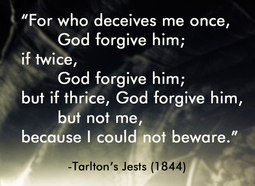 How many times one should forgive is a question for the ages. You have heard the phrase, "Fool me once shame on me, but fool me twice shame on you.There is a Jewish tradition of forgiveness being given in triplets. To forgive that much one was considered to have a generous spirit.. This kind of forgiveness mirrored God's forgiveness to Gideon and to Israel. Even Job talks about God forgiving in this manner. So, Peter's suggestion of forgiving seven times must have seemed more than generous. And, let's not discount Peter's clever use of the number seven. SEven was considered a holy and perfect number. God rested on the seventh day after creating the heavens and the earth. Samson's long locks were braided in seven plaits. The walls of Jericho fell after seven priests marched around the city seven times; blowing their seven trumpets. It is a perfect number and Peter was asking, in a roundabout way, if we should forgive perfectly. Jesus wasn't seeking perfection, as if forgiveness was some formula or recipe. We can all do somethings perfectly if we put our mind to it. Some of us can bake the perfect cake, some of us can rebuild the perfect engine, perhaps some of us can pull a perfect score from a level in a video game. We can perfect our daily routine, or say the perfect thing to someone in need. In many ways those are things that are perfected by rote or paying attention to directions. Forgiveness doesn't happen that way. Forgiveness is organic and messy. It's not perfect, it's beyond perfect. When we seek honest forgiveness from God there is no limit to the amount we will be forgiven. It is an unimaginable debt being taking from us all the time. Unlike Gideon and Israel this forgiveness is greater than three and unlike Peter's query it is greater than seven. This forgiveness is eternal. It is a debt we can't ever be able to repay. It's as if we owe billions in back taxes. No normal human could pay that kind of debt, yet God forgives it. That forgiveness is beyond perfection. Yet, we are the ungrateful servant. We are forgiven but we see someone who has done something against us and we can't bring ourselves to show the same love and compassion. And, don't think that Jesus was minimalizing the second person's sin. He owed the first person a 100 days worth of wages. Take your yearly earnings and divide by three. Imagine owing that kind of debt to someone else. It is doable but not easy. Yet, instead of seeing how reconciliation was possible the first servant wants vengeful justice: an eye for an eye... Hate cannot drive out hate. A new kind of darkness fell over much of the world on September 11th. No longer could evil be tied to a specific dictator or tyrannical leader and no longer could American soil be considered a safe place from such evil. We could have searched for a face to begin the path of forgiveness, to not let sin beget sin; instead we searched for a face to exact revenge. It all made sense thirteen years ago. The American reaction was sudden. It was as if the planes on that day were a foot and we were the ant pile. On September 10th we were complacent and content in our home but once our home was kicked up we attacked. It was a knee jerk reaction, and an honest reaction to pain and suffering. It was a reaction that cost us. The War in Afghanistan has cost far more lives from multiple sides than the initial attacks on 9/11... Darkness cannot drive out darkness. Just as Peter was clever in using the number seven, Jesus was clever in using the number seventy-seven. The problem with Peter's number is it has a conclusion, a finality to it. You can choose to forgive someone but if you are keeping track just how many times you should forgive than you are not doing it authentically. It is like promising to give someone fifteen minutes of your time and all the while you are staring at the clock. Perhaps you are doing everything the person asks of you perfectly but you are not truly giving your time. Once again, you might be able to forgive 'perfectly' seven times but you wouldn't be forgiving correctly. Jesus uses the number seventy-seven because it was a number one couldn't keep track of. In other words, we shouldn't be thinking about when we need to stop forgiving in the middle of our forgiveness. In that case, even if we say and act everything perfectly we never really mean it. So now what do we do? Today, thirteen years after the initial event, our collective memory is still raw and hurt. We need to start putting stars back in the night sky until the dawn arrives. We need to forgive those who hurt the world's psyche so much on September 11th. And maybe that is just the first step. Maybe we need to look into our hearts and really understand who we need to begin forgiving in our personal lives. Forgiveness does more than just help the person you are forgiving. Forgiveness brings your heart right with God. It not only heals the person who has acted out in sin but heals your wounds as well.
Matthew 18:15-20 CEB “If your brother or sister sins against you, go and correct them when you are alone together. If they listen to you, then you’ve won over your brother or sister. But if they won’t listen, take with you one or two others so that every word may be established by the mouth of two or three witnesses. But if they still won’t pay attention, report it to the church. If they won’t pay attention even to the church, treat them as you would a Gentile and tax collector. I assure you that whatever you fasten on earth will be fastened in heaven. And whatever you loosen on earth will be loosened in heaven. Again I assure you that if two of you agree on earth about anything you ask, then my Father who is in heaven will do it for you. For where two or three are gathered in my name, I’m there with them.” Full transparency: This scripture saddens me, and this is why. I use the Revised Common Lectionary to work through the bible. Mainly, starting with scripture and what it means, keeps God the center of my study. I'm not taking what I want to say and finding the scripture that fits it. Because the Revised Common Lectionary comes up every three years, I see three years as a milestone. Three years ago, I was very pregnant. I had used my days off for about six months to meditate and write sermons leading up to and after the baby was due. The church I was working for was not offering maternity and I didn't feel it was my place to ask for it. Having two months of sermons pre-written was preparing for having a baby with no maternity. Little did I know, the Elders were also preparing to ask for my resignation two weeks after my daughter was born. The worst part of it all was this scripture. I gave this sermon just two months before it all went down. To this day I feel this sermon was God inspired, meant for the congregation already determined to act. Too many people were hurt because the outcome was never approached in a Christian manner. In fact, as a side note, in the end the two months of sermons were used against me as my lack of acting extemporaneously. Please read this meditation with all this in mind. When Christian Community fails, it can fail tremendously. If you think you have discovered an easy way in Christianity than you better re-chart your course because you are headed in the wrong direction. Yes, the Christian path is rewarding, and yes it is fulfilling, but it is most definitely not easy. Many times I think it is like walking a tight rope. On one side you have to worry about your own care and wellbeing while one the other side you need to concern yourself with the care and wellbeing of others. On one side you have your sights set heavenward and your focus on God while on the other you have a mortgage, a full time job, kids to take to baseball practice, a checkbook to keep balanced… you fill in the blank. And no, you can’t choose one over the other. That would be easy. So of course today’s scripture will not be an easy one to embrace. It answers the question we most want to avoid- what do we do when those close to us cause pain and suffering upon ourselves? What does Jesus want us to do? Let me start from another direction: this is what we shouldn’t do. First of all, we shouldn't fight. There is no battle that is going to make the situation any better. I dare you to name a biblical fight that ended well in the long run. Even if the “good guys” win, animosity and anger still exists between both parties. That can be the cost of someone "winning." Fighting also inevitably causes more damage to reach a conclusion. In fights feelings are hurt, long held ties are broken and bridges are burned. We also shouldn't ignore. I have never seen an issue in the bible Jesus ignored or ran away from. It was the Pharisees and Sadducees who ignored. They ignored those who were not like them, those who could not keep up with the hefty temple tax, and those who were considered sinners. Not Jesus. Jesus never ignored anyone, even the Pharisees and Sadducees. He talked and taught to anyone who would have an ear to listen. He ate with anyone who had a table to share. No, ignorance is not bliss. Ignoring, whether intentional or not, is like an ostrich sticking its head in the dirt. You are not hiding anything, only allowing the problem to persist. Let’s add choosing sides to the list. I said this before and I will say it again. Jesus did not come to draw lines in the sand but to obliterate lines made by others. Once we get into an ‘us versus them’ mentality we have already lost the battle before we ever engaged in the war. Even today, we throw stones to solve our problems. True, unless it is an extreme case, those stones are more verbal than physical. When we talk about others behind their back or engage in bullying on an adolescent or adult level, well, we are throwing stones. Those stones create barriers and cut us off from healing and reconciliation. Jesus was a radical in many respects. Jesus did not throw stones. Instead he erased the barrier by saying, “Let those who is without sin cast the first stone.” Oh, and there is one more I can easily add. We shouldn’t act out in a passive aggressive way. Want to know just how serious passive aggressive behavior is? Judas acted passive aggressively. I truly believe he betrayed Jesus for a few coins not because he was selfish but because he was trying to force Jesus’ hand. He acted behind Jesus’ back to make him rise up and rule with an iron fist. As all passive aggressive behavior does, it backfired terribly for Judas. I am most concerned by this kind of behavior because this behavior has the biggest chance to destroy a congregation from the inside out. As Christians we know we shouldn't fight, ignore or choose sides, but goodness, sometimes we get angry. Angry and fearful. It is that fear and anger that pushes us to share our problems in unhealthy ways. We end up getting third parties involved in our disagreements instead of dealing with the issue head on. We turn individual disagreements into group disputes. Passive aggression can destroy someone before they even have a fair chance. In many ways all the examples I just mentioned are the easy way out. They all kind of stem from the same feeling,"They hurt me now I am going to hurt them." It purposefully chooses to cut people off. None of the examples deals with the problem. Well, let me tell you something, Jesus knew we would be inclined to turn to these kinds of negative solutions. That is why this scripture exists. From the time the forbidden fruit was taken from the tree, God knew we needed rules and fences to protect us… from ourselves. Come earth wind or fire nothing can cause more damage to the delicate equilibrium of humanity than humanity. Any time God asks us to put down our weapons and work together it always goes well at first, but eventually something goes wrong. It’s human nature. What are we to do? 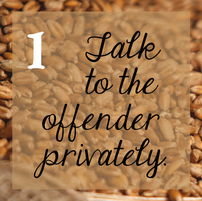 When we have a disagreement with someone the first thing one should do is stop. Take a deep breath. Impulsiveness usually leads to negative outcomes. When we could fight, ignore, choose sides or act passive aggressively Jesus asks us to first talk to the offender privately. Now for those of you who think this is an easy first option you have something I do not. Jesus also asks us to do all things in humility which means talking to the offender with an open and honest heart. When a person is wounded the last thing they want to do is openly talk to the person they believed wounded them. I am sure some of you are thinking, “Why do I have to talk to them first? Why are they not coming up to me and apologizing?” I have two answers for you and both of them are not easy to take in. First, we give a lot of credit to others. We often assume they know exactly what they are doing 100% of the time. The truth is we do many things in life we have no clue we have done. Some actions take months, even years, to come to fruition. Someone may have done something wrong against you but they may not even know it. How is someone going to say sorry if they don’t even know they are supposed to say sorry? Exactly. Second, and this one is more difficult to accept, if you talk to your offender you may find they were in the right. That is where humility comes in. Very very rarely is one side of an argument completely in the right. Talking to someone privately just doesn’t save their face, it may just save yours too. The privacy avoids embarrassment from both sides. Usually the first step is the only one you ever have to take.  However, if this person has chosen not to listen after this gallant first step, it is time for an intervention. Once again this is not an easy step. Humanity does not deal well with rejection and to be rejected once and possibly rejected again, can seem daunting and uncomfortable. You might think these steps exist because you just got to keep giving people chances to repent. I don’t think so. I think these steps are in place to protect the accused. The next step seeks a few more people to enter the dialogue. Those extra people become peer mediators. They are not there to pick a side. These two or three are there to listen to every word, not just the words of the accuser. (That is part of the reason passive aggression is so dangerous because usually only one side of an argument is heard.) If you have to take a disagreement to the second step you have to be willing to accept you could be wrong. If you don’t go through this step with such a mindset you are simply looking for a witch hunt. 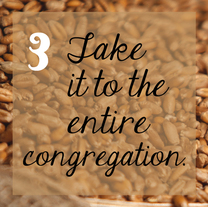 If this step does not bring reconciliation then you take it to the entire congregation. Once again this is to protect the accused. Why? It is really easy to make those two or three people your buddies or friends who would find it difficult to have an impartial view. Without these steps it would be easy and alluring to work the system. Some of you might wonder why we would need all these steps. The person who feels slighted appears to need some vindication. That is an easy answer. Ah, an easy answer, that’s why it’s not the Christian answer. Jesus didn’t want easy answers that would eventually tear congregations apart; he wanted difficult choices which would bring a congregation together. Whether you like it or not, the person who has done you wrong is still loved and cared for by God. God wants that person to be included in the Body of Christ just as much as God wants you to be included. Now the last and most difficult step: There are many who believe this scripture invoke rules on how to excommunicate someone from the church. They believe it is a way to give it a good ole’ try but unfortunately it just didn't work out so they have to part ways. (You know, putting excommunication in a good light. There have been some pretty nasty excommunications in Christian history.) But, Jesus didn't give us permission to cut them off from the family. No, he told us to treat them like Gentiles and tax collectors. So how did Jesus treat tax collectors and Gentiles? Just using the Gospel of Matthew I can answer that question. In 11:19 it was written, Jesus was friends to the tax collectors and sinners. In 8:10 he praised the faith of the Centurion servant who was a Gentile. In 9:10 he ate with tax collectors and sinners. Oh, and let’s not forget our scripture a few weeks back about the Gentile woman who wanted her daughter healed. Her faith healed her daughter. That doesn't sound like excommunication to me. That sounds to me like the most difficult road to take. When someone has done something wrong against you, try your hardest to work it out by taking multiple avenues of reconciliation. If those avenues fail, be with them and love them and guide them. Help them back into the inner circle. I don't know about you but that sounds like something that is going to take longer than a week to work through. But please, think it out. This whole scripture sets up next week’s question: How often should we forgive? In the shadow of September 11th, it forces us to answer some really tough and difficult questions. But, do not fear. As long as our minds and hearts remain centered on Christ where two or three are gathered Christ will be there with us. If you feel your situation is abusive, and not just a disagreement, please feel free to email me, or contact me through PM in Reddit or Facebook. If I cannot help you, I can point you in the right direction.
|
Categories
All
Archives
October 2023
|


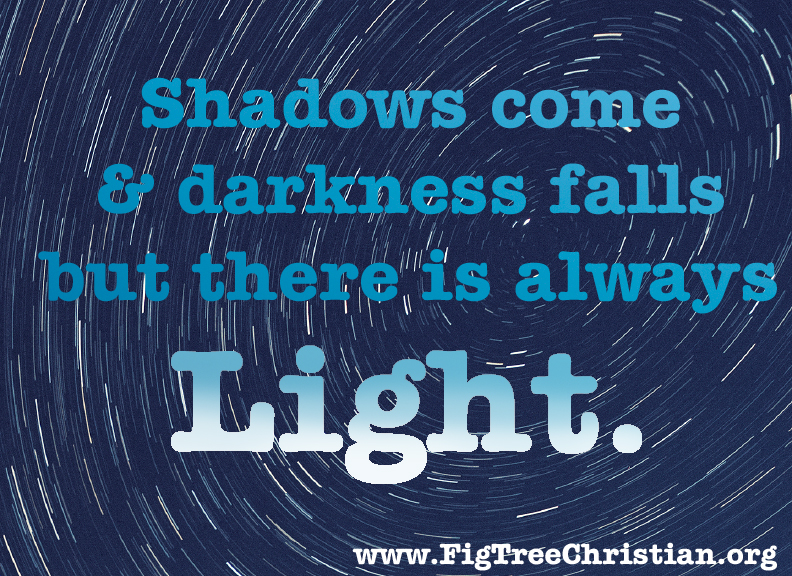
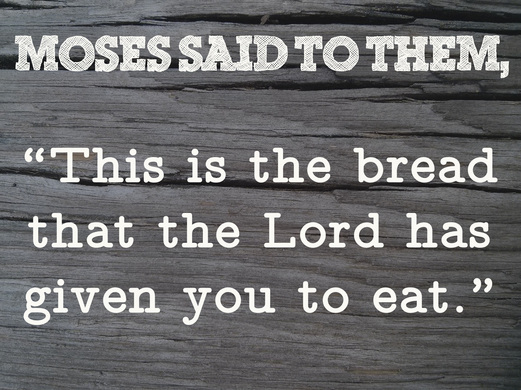
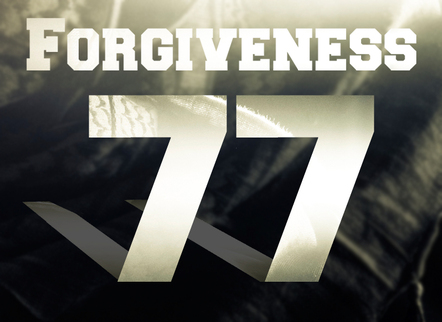
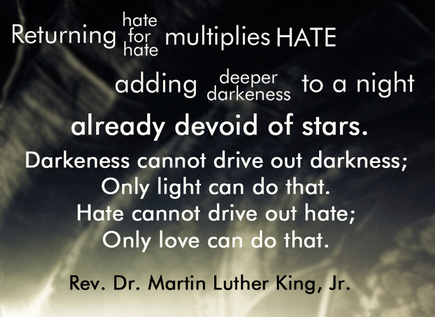






 RSS Feed
RSS Feed